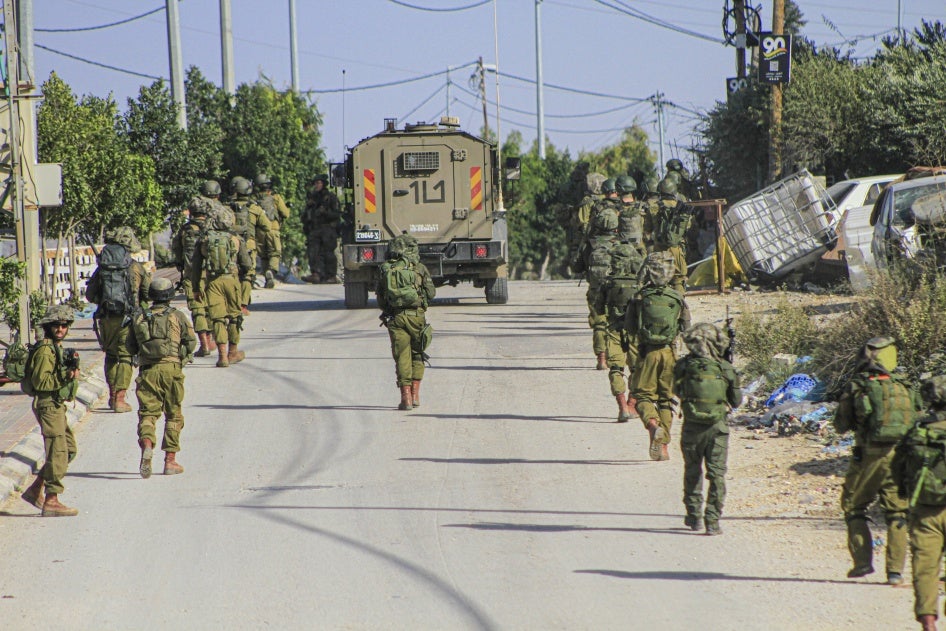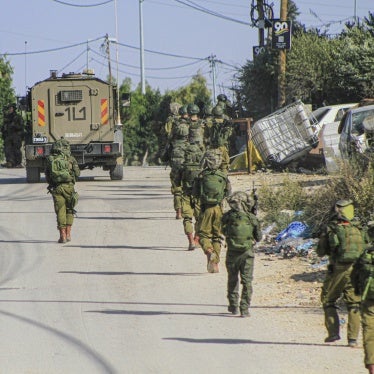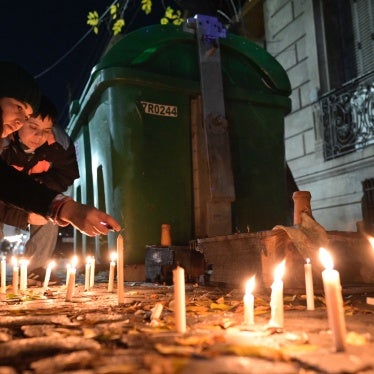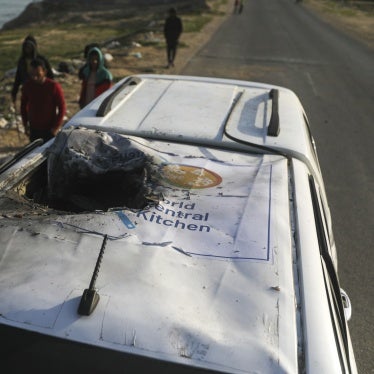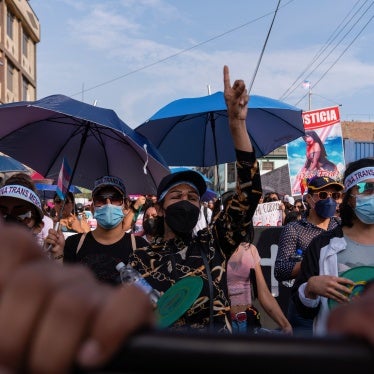The following questions and answers address the international legal framework applicable to violence and the use of force in the West Bank. Human Rights Watch in October 2023 published a question-and-answer document focused on the international law governing the hostilities between Israeli forces and Palestinian armed groups in Gaza following the October 7 Hamas-led attacks on Israel. On May 8, Human Rights Watch reported on the killings of Palestinians in the West Bank.
- What international law applies to the West Bank?
- What legal standards govern the use of force in the West Bank?
- When Israeli forces raid Palestinian communities in the West Bank, can they intentionally use lethal force against members of Palestinian armed groups?
- Are Israeli settlers in the West Bank lawful targets?
- What are the responsibilities of authorities regarding violence committed by people in their territory?
The West Bank, including East Jerusalem, and the Gaza Strip is an occupied territory (the Occupied Palestinian Territory) under international humanitarian law, also called the laws of war. This body of law addresses conduct by all parties to an armed conflict, including the means and methods of warfare and the treatment of people in custody, providing civilians and others with a set of protections. It recognizes the Israeli occupation as an ongoing armed conflict. The law of occupation, applicable to occupied territory, can be found primarily in the Fourth Geneva Convention of 1949, the Hague Regulations of 1907, and customary international law.
International human rights law also applies to Israel’s conduct towards Palestinians in the occupied territory. The United Nations Human Rights Committee, the independent expert body that interprets the International Covenant on Civil and Political Rights (ICCPR), has for example repeatedly found that states are bound to respect the human rights treaties they have ratified outside of their borders and specifically that “the provisions of the Covenant apply to the benefit of the population of the Occupied Territories.”
The International Court of Justice endorsed this view in its advisory opinion regarding Israel’s separation barrier, and stated that the ICCPR “is applicable in respect of acts done by a State in the exercise of its jurisdiction outside its own territory.” The State of Palestine has also ratified the ICCPR and other human rights treaties, reinforcing their applicability throughout the occupied territory.
Israel maintains that its human rights obligations do not extend to the occupied territory.
While the law of occupation permits occupying powers to impose security restrictions on civilians, it also requires occupying powers to restore public life for the occupied population. That obligation increases over time in a prolonged occupation, as the occupier has greater opportunity to develop responses that are more narrowly tailored to security threats and that minimize restrictions on rights. In addition, harm caused by the indefinite suspension of basic rights on the occupied population increases over time. Human Rights Watch has called on Israeli authorities, after more than a half-century of occupation, to fully respect the human rights of Palestinians, using as a benchmark the rights enjoyed by Israeli citizens.
The Palestinian Authority also has obligations to protect human rights in the West Bank and not to commit rights abuses and laws-of-war violations.
International humanitarian law and international human rights law provide distinct sets of rules that regulate the use of force. The particulars of a given situation determine whether to apply the rules regarding the legality of use of force applicable in law enforcement—governed by international human rights law—or the rules governing the use of force under the laws of war.
When Israel and Palestinian non-state armed groups engage in hostilities, as in Gaza amid the ongoing hostilities since the October 7 Hamas-led attacks, their actions are governed by the conduct of hostilities standards rooted in the laws of war, consisting of treaty law and customary international humanitarian law applicable in non-international armed conflicts. The treaty law, notably Common Article 3 to the Geneva Conventions of 1949, sets forth fundamental protections for civilians and captured combatants of both states and non-state armed groups.
However, when Israeli security forces, whether soldiers or police, perform law enforcement functions regarding the occupied population, international standards regarding law enforcement apply, including the ICCPR and the United Nations Basic Principles on the Use of Force and Firearms by Law Enforcement Officials.
In the West Bank, there are insufficient grounds at present to find that a non-international armed conflict is taking place between Israel and Palestinian armed groups. This could change if armed violence in the West Bank reached a certain level of intensity and armed groups in the West Bank displayed a sufficient degree of organization to abide by the laws of war. If and when Palestinian armed groups currently fighting in Gaza conduct military operationsin the West Bank, the laws of war would apply to fighting between those armed groups and the Israeli military.
In general, for there to be a non-international armed conflict, the hostilities would have to be conducted by force of arms and involve such intensity that the government would be compelled to employ its armed forces against opposing non-state armed groups. Factors to be considered in evaluating the intensity include, for example, “the number, duration and intensity of individual confrontations” and “the type of weapons and other military equipment used,” as well as “the number of persons and type of forces partaking in the fighting.” Factors to be considered in evaluating the degree of organization of the non-state armed group include the level of common leadership and purpose, the existence of a command structure, and the ability to plan, coordinate, and carry out military operations.
Based on these standards and research findings, Human Rights Watch has applied law enforcement standards rooted in international human rights law to analyze recent Israeli raids in the West Bank. Human Rights Watch used similar standards in its analysis of Israel’s use of force in 2018-19 against the “Great March of Return” demonstrations in Gaza along the fences that separate Gaza from Israel.
Even when applying law enforcement standards to the analysis of particular instances of use of force in the West Bank, certain protections of the laws of war also continue to apply because the West Bank is occupied territory.
The Israeli army carries out law enforcement in the West Bank, acting in a policing capacity. The law enforcement standards rooted in international human rights law therefore apply to its policing in the West Bank. These standards set out strict rules on the use of force and firearms by law enforcement officials. They prohibit the use of firearms except in specific situations, such as to confront “the imminent threat of death or serious injury” or “the perpetration of a particularly serious crime involving grave threat to life,” and “only when less extreme means are insufficient to achieve these objectives.” They provide that intentional use of firearms may only be made when strictly unavoidable to protect life.
These standards prohibit security forces from intentionally using lethal force, including against members of armed groups, when there is no imminent threat to life.
During situations covered by these standards, willful killings of individuals by security force officers outside what is permissible under law enforcement standards are serious violations of the right to life as defined by international human rights law.
Israeli settlements are unlawful under international humanitarian law. However, Israeli civilians living in unlawful settlements in the occupied territory do not lose their protections under the laws of war. Article 49 of the Fourth Geneva Convention states that “the Occupying Power shall not deport or transfer parts of its own civilian population into the territory it occupies.” Indeed, it is because Israeli settlers are civilians that the act of transferring them to the occupied territory constitutes a war crime by the authorities carrying out the transfer. The fact that a person has willingly moved to a settlement or lives in one does not make them a legitimate military target.
Israeli civilians living in the settlements maintain the protections that the laws of war provide to all civilians. But when settlers or other Israeli civilians join in military operations with the Israeli army or engage in military operations as part of organized civilian security forces set up by municipal authorities in settlements, they may be “directly participating in hostilities.”
These civilian security forces fall under the operational responsibility of Israel’s Defense Ministry and army, as well as settlement councils, and, as per a 1971 military order, act “on behalf of the army.” They play a security role that extends beyond checking for identification and have the authority to use lethal force, similar to military forces. Israeli authorities distributed assault rifles to “civilian security squads” following the October 7 Hamas-led attacks in Israel, according to media reports.
When settlers actively take part in hostilities, they lose their immunity from attack and become legitimate military targets. Civilians lose their immunity from attack when and only for such time as they are directly participating in hostilities. Similarly, reservists of national armed forces, including in the Israeli army, are considered civilians except when they go on duty, in which case they are combatants subject to attack at all times, unless captured or incapacitated.
Even when individual settlers temporarily lose their protections as civilians because of their direct participation in hostilities, Palestinian combatants carrying out attacks against military targets need to take all feasible precautions to avoid harm to other civilians and civilian objects.
The same standards regarding direct participation in hostilities apply to the conduct of Palestinian civilians taking part in fighting alongside Palestinian armed groups during armed hostilities, as Human Rights Watch laid out in a 2023 questions-and-answers document published following the October 7 Hamas-led attacks on Israel
All states and non-state armed groups engaging in armed conflict have a responsibility to ensure that those within their chain of command obey international humanitarian law, including by protecting civilians. In addition, states have an obligation to investigate and appropriately punish serious laws-of-war violations and other crimes in violation of international law taking place on their territory or under their jurisdiction or committed by members of their forces.
Under the principle of command responsibility, individual military and civilian commanders may be held criminally responsible for war crimes committed by forces and subordinates under their effective command and control, where they knew or should have known the forces were committing war crimes and they failed to take all reasonable measures to prevent the crimes or submit the matter for investigation and prosecution.
International human rights law places obligations on government authorities and recognized non-state actors exercising functions of government to maintain law and order in accordance with human rights standards. These authorities have an obligation not to engage in, instigate, encourage, or incite discrimination, hostility, violence, or unlawful acts of force. This applies to Israeli and Palestinian authorities. They should take all lawful measures within their power to prevent unlawful attacks, not praise, honor, or reward such attacks, and should investigate potential wrongdoing and hold those responsible to account.
